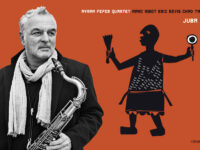According to the American Heritage Dictionary, enfants terribles describes “one whose startlingly unconventional behavior, work, or thought embarrasses or disturbs others.” Alto saxophonist Lee Konitz has enjoyed a six decade career where he’s been in the thick of unconventional work — Miles Davis’ Birth of the Cool Nonet and Lennie Tristano’s groundbreaking sextet, anyone? — but his mark on jazz is nothing to be embarrassed about. A free, deeply curious spirit, he’s long tended to gravitate toward projects that challenges him or puts him in unconventional settings.
His latest album, the upcoming Enfants Terribles, doesn’t at all seem on the surface to be one of those times where he’s stretching out. It’s a live date of done-to-death jazz standards with a backing guitar/acoustic bass/drums backing band. Ho hum, right?
Not quite. Forget what instruments are being played. The guys playing them are much more instructive about what this record is like: Bill Frisell, Gary Peacock and Joey Baron. These artists are also free spirits, incapable of playing things conventionally even at gunpoint. And Konitz, as a kind of forebear to these cats, attitude-wise, is a kindred spirit. Add to that singular Konitz tone, a slightly fragile one with a lot of that old school romanticism in it, a sound that helped to simultaneously define the both the cool and nascent progressive jazz movements of the early 50s.
Video of “All The Things You Are,” performed around the same time as the recordings on Enfants Terribles:
Staying within the orbits of each song, everyone gets to express themselves in their own unique ways, not the last of whom is Konitz himself. However, it’s the airy, open and sometimes abstract way these standards are undertaken that often take center stage; there are four distinct things that go on with each song, but somehow they all fit together.
Frisell assumes a front line role alongside Konitz on “What Is This Thing Called Love,” leaving the chordal comping role vacant. It’s merely implied, and the musicians seem to be playing as if the piano player exists, creating music in the abstract. The approach is fresh, and that came about perhaps because this was the first time Konitz had played these songs with these guys. At the same time, their collective approach also hearkens back all the way to Konitz’s Lennie Tristano days.
Baron is the real game-changer in this set; his attention to tonal detail rivals the late Paul Motian. He smoothly switches between sticks and hands on the drums, engaging in a sublime tete-a-tete with Peacock during “Body And Soul.” Elsewhere, he’s mixing up timekeeping with freeform percussion, managing to not disrupt the flow of a song while doing this. Frisell’s sideman role is somewhat subdued compared to the projects he leads, as you would expect, but his masterful ability to dig into a timeless melody, be it John Lennon’s or in this case, “Stella By Starlight” and “I’ll Remember April” is stellar and provides good counterpoints to Konitz. Peacock, who gives songs like these regular workouts as a member of Keith Jarrett’s Standards Trio, displays more than a passing familiarity with these tunes, as displayed by his polished unaccompanied bass solo at the beginning of “I Can’t Get Started.”
For a guy born in the 1920s and who started his professional career the same year that World War II ended, Lee Konitz isn’t playing too shabby. Enfants Terribles is a record most talented twentysomething jazz musicians would kill to make. Konitz, an alto saxophonist who as a bop player in the 40s didn’t copy Charlie Parker, is an original himself impossible to replicate. Even today.
Enfants Terribles will go on sale September 25 by Half Note Records.
[amazon_enhanced asin=”B008SVS44W” /] [amazon_enhanced asin=”B000000YAD” /] [amazon_enhanced asin=”B00000J8P4″ /] [amazon_enhanced asin=”B0050PLTH8″ /] [amazon_enhanced asin=”B0056H0SHM” /] [amazon_enhanced asin=”B004VFYORA” /] [amazon_enhanced asin=”B000000YQ0″ /] [amazon_enhanced asin=”B0038N8SWI” /] [amazon_enhanced asin=”B000006Q6B” /] [amazon_enhanced asin=”B00005614M” /]
- Claudio Scolari Project – ‘Bloom’ (2025) - June 12, 2025
- Denny Zeitlin – ‘With a Song In My Heart: Exploring The Music of Richard Rodgers’ (2025) - June 4, 2025
- Ches Smith Quartet – ‘Clone Row’ (2025) - May 30, 2025



